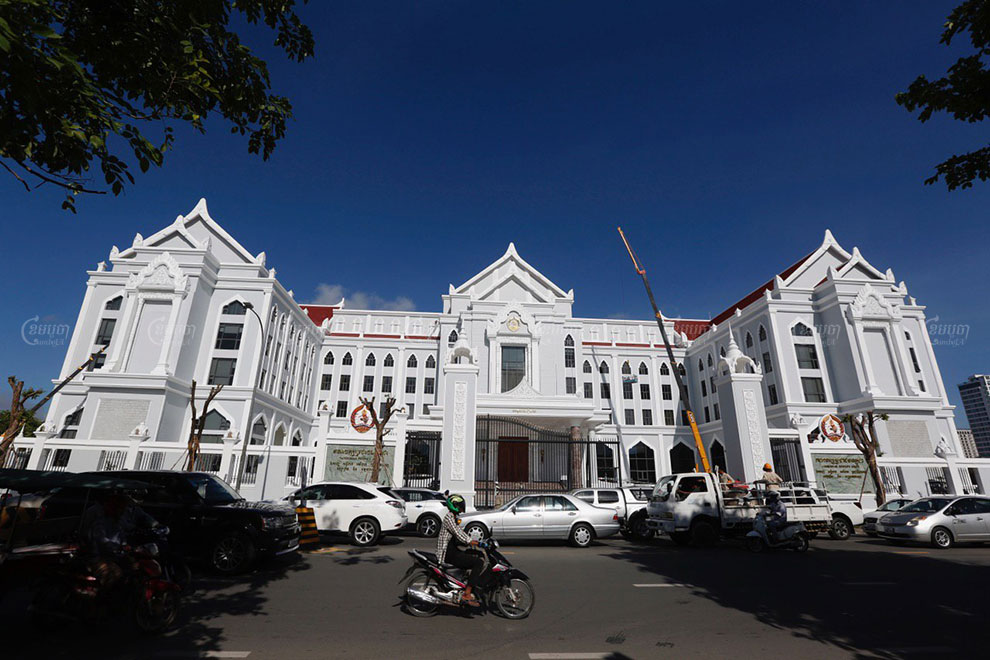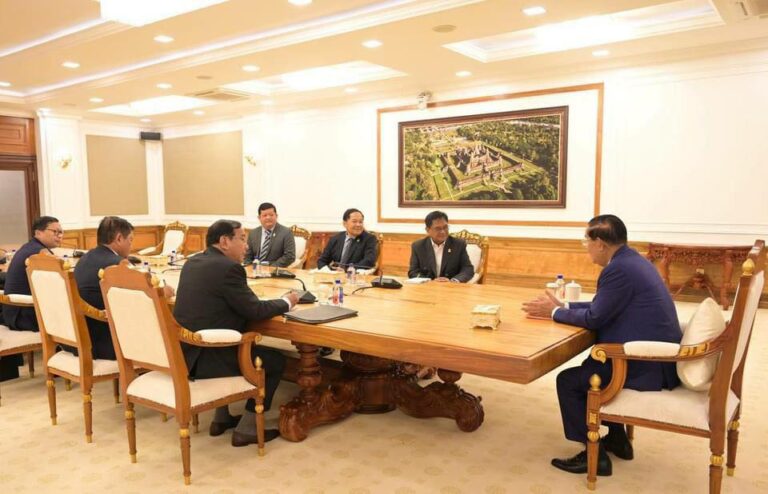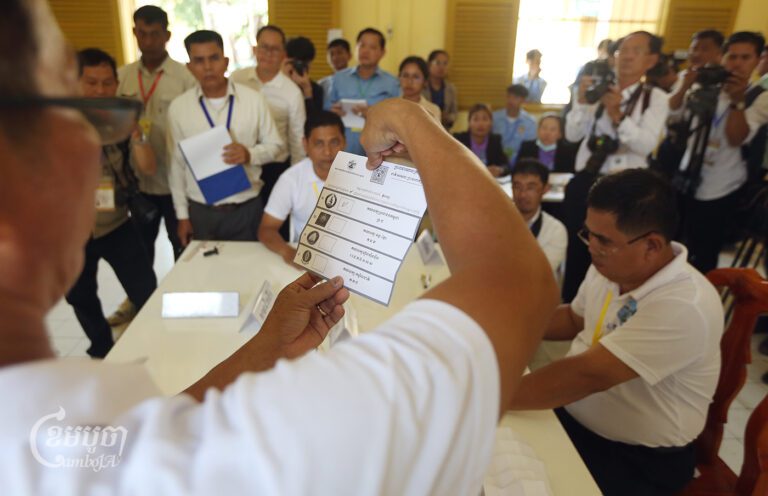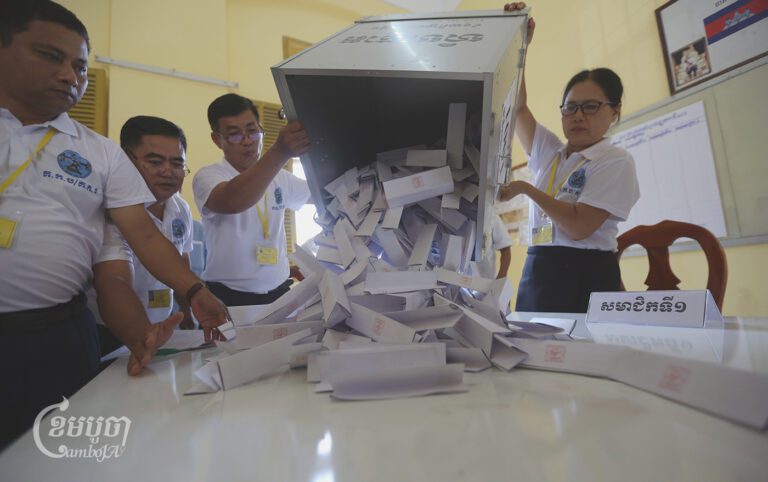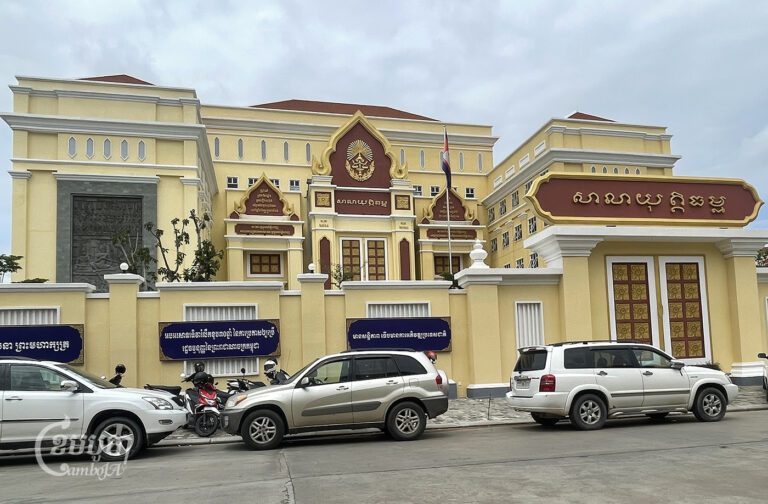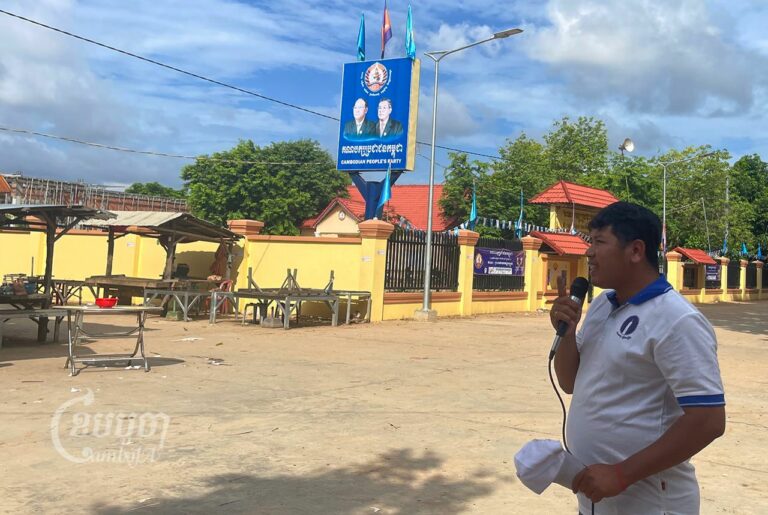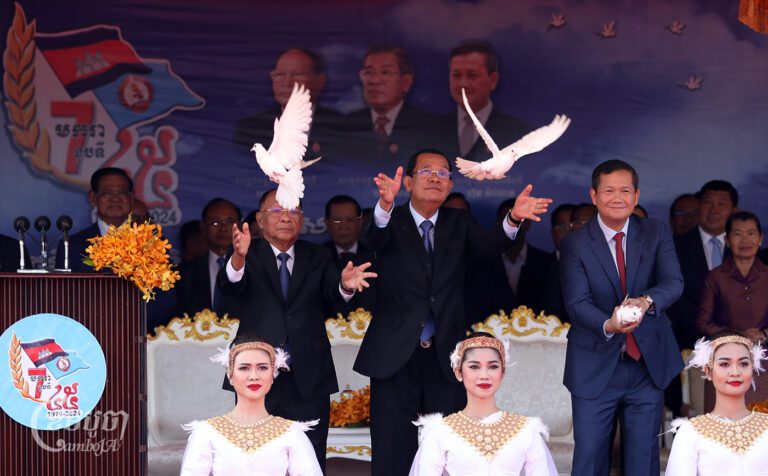Prime Minister Hun Sen boasted this week that his party’s new $30-million headquarters was built to last a century, prompting criticism from the opposition that the CPP had no intention to ever give up power.
The five-story building along Norodom Blvd. in Chamkar Mon district, spanning 50,000 square meters of floor space including a 4,000-seat conference venue, will be officially inaugurated on Sunday, June 28.
Speaking at an inspection of the construction of Phnom Penh’s new international airport on Monday, Hun Sen said funds for the new headquarters, which cost $30 million, had been donated by party members, including businesspeople and farmers.
“It is not difficult [to get] $30 million to build party headquarters as the ruling party,” he said, before adding that the CPP had no real rival.
“We’re building it not for two to three years but for the next 50 years, 100 years, you have to remember,” he said. “Who has the capability to replace Hun Sen right now? Let’s be honest and come out and say it.”
In an apparent reference to the opposition’s Sam Rainsy, his long-time sparring partner living in exile in France, Hun Sen said “you” would not be able to take up the reins of power during his lifetime.
“You are the only one who wants it, but will have to wait for the next life,” Hun Sen said. “Where there is Hun Sen present, the Cambodian People’s Party present, you will have to wait for the next life.”
The prime minister added that he had no challengers in his own party either. “There is no one in the Cambodian People’s Party.”
The CPP is said to historically have had factions challenging Hun Sen, notably one led by the late Chea Sim, with Interior Minister Sar Kheng among its members. However, analysts say Hun Sen has increasingly tightened his grip on his own party in recent years.
The country has also veered toward the CPP’s dominance in politics. In 2013, the opposition CNRP pushed the ruling party to near defeat in that year’s national election. But the party was controversially dissolved by Supreme Court order in 2017, leading the CPP to sweep all 125 seats in the 2018 election.
Ke Bunkhieng, the former chief of the CPP’s youth wing, said the new party headquarters indeed demonstrated a clear vision for the CPP to continue to lead the county into the future.
“It means that the CPP will continue to lead the country for a long time to serve the interests of the people,” he said. The party will stay in power according to the will of the country’s citizens, he added.
“The Cambodian People’s Party has already committed to upholding the democratic process following the model of Cambodia, so it means that citizens are the ones who have the genuine right to choose their political parties and leaders who serve the national interests of the motherland,” he said. “As you have seen in our history, Cambodia has achieved peace and stability for a long time like that.”
On June 8, Hun Manet — Hun Sen’s eldest son — replaced Bunkhieng as the head of the CPP’s youth wing. Bunkhieng is now deputy chief of education for the CPP’s central permanent committee.
Former senior CNRP official Ou Chanrath said, however, that in a truly democratic country, the ruling party should not expect to rule forever — it should instead be prepared to cede power through elections.
Hun Sen’s words on Monday reflected Cambodia’s move toward a “dominant party system,” where opposition parties have little chance to gain power, Chanrath said.
“It is the ambition of a leader who holds onto power,” he said. “In a democratic country we have never seen anyone continue in power [forever].”
“The CPP thinks they are doing nothing wrong, but the whole world will view it as an ambitious hold on power,” he said.
Chanrath noted that Singapore and Japan were examples of countries where the ruling parties had held onto power virtually uninterrupted for decades. But they had higher levels of development, and, in Japan’s case, greater freedoms, he said. Mexico was another case with a dominant party but it suffered from corruption and violence, he argued.
“Cambodia can go down one of these two paths, but our past experience has been suffering as a country under one-party rule,” he said.
Cambodia’s courts lacked independence, there was corruption, injustice and human-rights violations, and the country remained poor, he said.
“I think if people become highly educated, they have the will for change, so there will be change even if he vowed to lead for the next 50 years,” Chanrath said.
Kong Monika, a former CNRP politician who now leads the Khmer Will Party, said the CPP’s new headquarters was “just an image,” and the ruling party’s dominance was uncertain.
“The most important thing is the people’s hearts, and they wanted change as we saw in the previous election,” Monika said, referring to 2013.
“I hope that in the next election, Cambodian citizens won’t let the ruling CPP continue to hold power as the only party [in parliament]; they will vote to choose parties they think uphold democracy,” he said.
Cambodia’s population was young, and wanted greater freedoms and rights, he said.
“They have a new mindset and norms, and they dislike restrictions on rights and freedoms, systemic corruption, and suffering such as due to land conflicts,” Monika said.
Sophal Ear, a political scientist at Occidental College in Los Angeles, said the CPP’s grand new headquarters was bound to eventually become a museum.
“Everything is impermanent, please, [learn] from Buddhism. The CPP’s headquarters will make a nice museum one day, just like Versailles in France,” he said in an email.
He added that one-party rule would slowly become less effective due to a lack of accountability.
“That is the problem of non-democracies. The economy will suffer longer; social issues will be ignored. Democracy will always be last; human rights? Forget about them,” he said.
However, ruling party spokesman Sok Eysan said the CPP’s dominance was based on its genuine popularity from fulfilling citizens’ wishes.
“We have done what people wished, and [followed] the will of people, so why do we [need to be] scared about holding onto power?” he asked. “Only people who lose elections need to cling to power.”
The ruling party had won fairly and democratically, he said. “The most important thing is we followed a principled, democratic path, so it is not strange that we remain in power.”
The party’s new headquarters simply reflected its success over decades, he said.
“Building the huge headquarters is deserved for the honor and power of the CPP,” Eysan said.
He noted that the CPP had earned its place in all elections since the restoration of democracy in 1993.
Controversially, however, the CPP lost the U.N.-organized 1993 election to royalist rival Funcipec, but rejected the results and entered a power-sharing coalition that ended in armed conflict in 1997.


